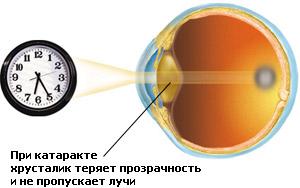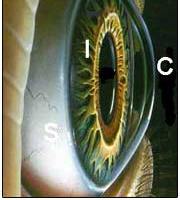What is Keratitis? What are his symptoms and treatment? For those who encountered keratitis, these questions are very important. You will learn answers to them by reading this article.
Content
Keratitis is inflammation of the cornea. Inflammation, as we know, can be caused by a variety of factors, but in the case of conjunctivitis, the reason is always one - infection. If keratitis developed, it means that microbes are breeding on the surface of the eye. The cornea is a protective shell of the eye, and therefore it is sufficiently stable a variety of damage and infections. This stability is enough to resist «random» Microbial invasions.
In the cornea every second «knock on» Thousands of microbes, like midges in windshield moving car. And all these bacteria are invariably dying (in a collision) or bounce aside. The functional reserves of the cornea are quite enough to resist such a daily launcher. However, in some cases, even such a hardy and well adapted structure, as a cornea, does not cope. This happens first of all when infecting neighboring structures.
Usually the situation looks like this: bacteria, being unable to overcome the cornea or at least settle on it, «Switchal» on more vulnerable elements. Really easily easily «conquer» conjunctiva. There the number of microbes increases many times, and they constantly attempt «Cook» Behind the cornea. Considering that the number of pathogen is now great, and the host's body is not excluded, exhausted by another disease (I will remind you that the cause of conjunctivitis is often viruses - the causative agents of the ARVI), then the chances of the microbe are increasing.
Regardless of the nature of conjunctivitis (virus it or bacterial), and, accordingly, on the type of microorganism (streptococcus staphylococcus, adenovirus and others), inflammation can overcome the cornea. Another potential danger source - inflamed tear bag.
In rare cases, Keratitis causes microbes brought to the eye of blood, but this is observed in exceptional cases (for example, when infected with blood - sepsis).
How keratitis is manifested
 Keratitis symptoms often resemble conjunctivitis. One of the first - symptom «Sand in the eyes», that is, the feeling of burning, soreness, the inability to open the eyes normally. Very often, this feature is complemented by tearing (violent or not very), redness of the eye.
Keratitis symptoms often resemble conjunctivitis. One of the first - symptom «Sand in the eyes», that is, the feeling of burning, soreness, the inability to open the eyes normally. Very often, this feature is complemented by tearing (violent or not very), redness of the eye.
As a rule, syphilitic keratitis occurs very hard. At the same time, the ailment of turbidity «Starts» from the most subsurface and slowly grow up, gradually covering the entire cornea. Then the vessels are growing into this area, and the vision in the affected eye often completely disappears.
The basis of the treatment of keratitis, like many other infectious processes - antibiotics. They are used in the form of droplets and ointments. Belie disease acquires a difficult course, drugs are additionally used inward in the form of tablets or injections. To eliminate clouds are used so-called «Remaining drugs». Good effect gives physiotherapy. It is used after the sacrament of acute inflammatory processes. Help to avoid impairment of vision and ultrasound therapy, and radiotherapy (applied to suppress the inflammatory process).
The effectiveness of treatment depends, firstly, from - the timeliness of its start, and secondly, on the nature of the inflammatory process. If inflammation is located superficially, does not penetrate the thickness, cornea, then, as a rule, it is possible to achieve complete absorption of clouds, and after a disease retreating, the vision on the recovered eye is completely normalized. If the inflammatory process is deep, then the likelihood that a muddy spot will remain at the end of therapy on the eye, increases. Syphilitic forms of the disease are usually difficult to treat.
Keratitis with the central location of the focus are especially dangerous. Such «uncomfortable» Localization overlaps the field of view» that delivers the discomfort to the patient. In addition, if the clouding has large sizes and for the time of illness, vision to the eye practically disappears, it appears a certain risk of blindness as a result of obscuration amblyopia.









